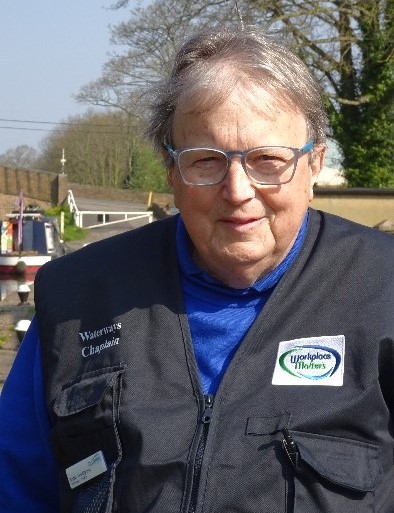Recent years have seen increasing number of people moving onto the waterways. People think that the waterways are quiet uninhabited backwaters, largely disused. Where once canals were used solely for transport purposes, they now attract a larger variety of people: boaters walkers, anglers, cyclists and businesses, as well as those seeking a floating home offering a calmer, less stressful existence.
Waterways Chaplains are volunteers from the local churches who are part of the community. They share good and bad times and are supportive and encouraging of all regardless of religion, orientation or race. They support people of all faiths or none, and are always happy to discuss spiritual and practical matters if invited to do so.
Typically, 4.5 million people visit the inland waterways every fortnight and there are about 36,000 boats currently in use, more craft are than at the height of the industrial revolution.
Waterways Chaplains walk the towpaths within a certain geographical patch e.g. The Grand Union Canal from Watford to Uxbridge. They are trained volunteers, who are assigned a mentor for the first few months and are from different backgrounds. Chaplains may be retired; Church members; perhaps GP’s or anglers who want to help their community or they just walk their dog along canals or rivers and see a need along their “stretch”.
Being a boater
People live and work on the waterways; some use their boats for recreational purposes, but many choose to live aboard their boat. Those who live aboard either rent long term moorings or cruise as much as they can. Without a permanent mooring the boat owner is required to move every 14 days or less: this means that as a live aboard boater they will not have a postcode which then makes it difficult to register with a GP, claim benefits, tax a car or open a bank account. Choosing this way of life does not always give access to schools, medical facilities or other amenities, and these problems are compounded when bereavement, depression illness or unemployment occurs.
Even though boating communities are very good at caring for each other in times of trouble, the network of waterways chaplains are placed to respond to the need as of those who are most vulnerable, responding to concerned community members, providing practical pastoral support, care and guidance.
A Boaters Tale
“Life was great on our boat. We were out of the rat race. Then the Covid pandemic struck and we both lost our jobs and income. We had fuel, food, heating and boat licence to pay for. After a time of wondering what to do next another boater suggested we contact the Waterways Chaplaincy. This seemed a good idea and when we contacted the Waterways Chaplaincy via their website, A Chaplain made contact with us.”
“With the Chaplains’ assistance we applied for help with our bills and they put us in touch with the local food bank. The Chaplain supplied us with sacks of coal to keep the boat warm. The Chaplain has stayed in contact to see if we are ok and has helped us get back on our feet.“

